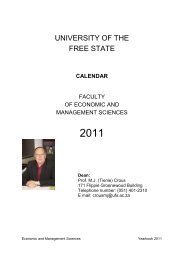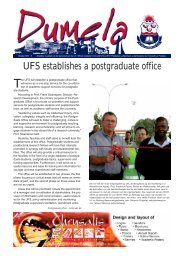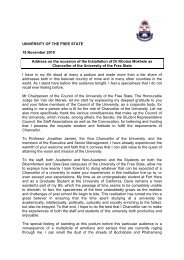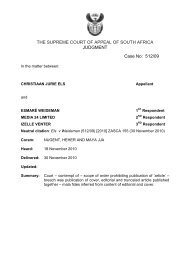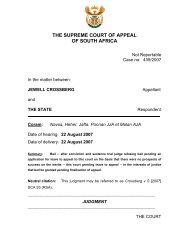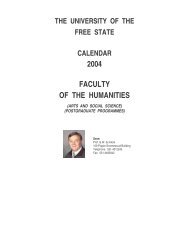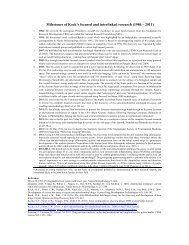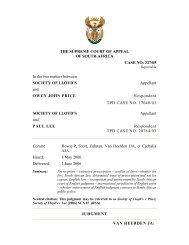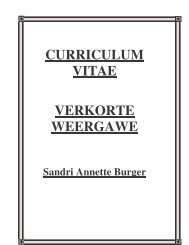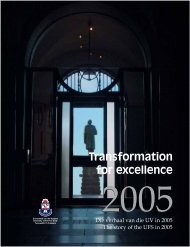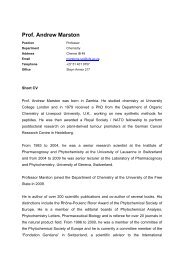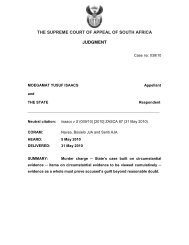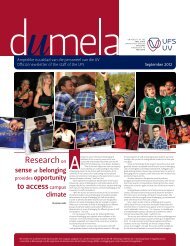New website - University of the Free State
New website - University of the Free State
New website - University of the Free State
You also want an ePaper? Increase the reach of your titles
YUMPU automatically turns print PDFs into web optimized ePapers that Google loves.
[Dealing with] welcoming students<br />
with disabilities in higher education<br />
By Hetsie Veitch<br />
I envisage a future filled with opportunities and possibilities for persons with<br />
disabilities, but enabling students with disabilities to participate on an equal<br />
footing with <strong>the</strong>ir peers and taking <strong>the</strong>ir rightful place in society is no easy task.<br />
According to recent research published by<br />
our Department <strong>of</strong> Industrial Psychology,<br />
persons with disabilities are accommodated<br />
and tolerated in <strong>the</strong> workplace, but rarely<br />
embraced and welcomed. It is our duty as<br />
Institutions <strong>of</strong> Higher Education to ensure<br />
that all our students have a sense <strong>of</strong><br />
belonging at our tertiary institutions.<br />
During <strong>the</strong> September break, <strong>the</strong><br />
first Higher Education Disability Services<br />
Association (HEDSA) symposium was<br />
hosted on our Main Campus and tertiary<br />
institutions from across South Africa came<br />
toge<strong>the</strong>r to discuss new beginnings and new<br />
directions, setting standards and working<br />
toge<strong>the</strong>r.<br />
The accommodation <strong>of</strong> persons with<br />
disabilities has to be an institutional process<br />
and not <strong>the</strong> work <strong>of</strong> a few motivated,<br />
passionate individuals manning a support<br />
programme.<br />
Revising our perceptions and attitudes<br />
is <strong>the</strong> first step in accommodating students<br />
who present <strong>the</strong>mselves, learn or perform in<br />
ways that are different from o<strong>the</strong>rs. It is vital<br />
to remember that <strong>the</strong>ir similarities with o<strong>the</strong>r<br />
students are much more significant: we are<br />
first and foremost dealing with students.<br />
Each student with a disability has<br />
very specific needs and because <strong>of</strong> an<br />
inaccessible society has previously been<br />
marginalised. The aim is to enable <strong>the</strong><br />
student to reach his/her full potential and not<br />
to provide an unfair advantage to students<br />
The research group <strong>of</strong> Pr<strong>of</strong>. André Roodt,<br />
Head <strong>of</strong> our Department <strong>of</strong> Chemistry,<br />
won <strong>the</strong> first prize in <strong>the</strong> category<br />
development <strong>of</strong> small medium and micro<br />
enterprises (SMME) at <strong>the</strong> annual Department<br />
<strong>of</strong> Trade and Industry’s (dti) award ceremony.<br />
Pr<strong>of</strong>. André received <strong>the</strong> prize for <strong>the</strong> hitech<br />
project Development <strong>of</strong> novel nuclear<br />
pharmaceuticals in <strong>the</strong> Technology and<br />
Human Resources for Industry Programme<br />
(THRIP).<br />
The dti Deputy Minister Bongi Maria<br />
Ntuli and Director-General Tshediso Matona<br />
presented <strong>the</strong> prize at <strong>the</strong> gala dinner held at<br />
Gallagher Estate, Gauteng.<br />
The dti’s Annual Technology Awards<br />
recognise excellence in research and aim<br />
to raise awareness on <strong>the</strong> benefits <strong>of</strong> using<br />
technology to improve <strong>the</strong> competitiveness<br />
<strong>of</strong> enterprises in <strong>the</strong> local and global<br />
arena. Individuals and organisations are<br />
recognised for <strong>the</strong>ir efforts in advancing and<br />
promoting technology interests and emerging<br />
enterprises.<br />
Pr<strong>of</strong>. André, also vice-president <strong>of</strong> <strong>the</strong><br />
with disabilities over non-disabled students.<br />
Any assistance rendered or advice given should<br />
be in consultation with all role players concerned.<br />
Individualised interventions and accommodations are<br />
provided following input from <strong>the</strong> particular student<br />
and o<strong>the</strong>r parties involved. The specialised services<br />
<strong>of</strong>fered by a support team must be utilised within <strong>the</strong><br />
framework <strong>of</strong> all parties involved taking responsibility<br />
for <strong>the</strong>ir involvement.<br />
The international guidelines from <strong>the</strong> United<br />
Nations Convention on <strong>the</strong> rights <strong>of</strong> Persons with<br />
Disabilities and our own Constitution promoting<br />
Human Rights are available for guidance in<br />
<strong>the</strong> absence <strong>of</strong> a dedicated South African<br />
law protecting <strong>the</strong> rights <strong>of</strong> persons with<br />
disabilities. Tertiary institutions also<br />
need to acknowledge <strong>the</strong> importance <strong>of</strong><br />
content regarding disability within different<br />
curriculums. The general public needs<br />
to be exposed to <strong>the</strong> issues pertaining<br />
persons with disabilities on a much wider<br />
and more extensive scale. This will also<br />
assist to create a greater awareness and<br />
sensitivity amongst non-disabled people.<br />
news<br />
“If we always think <strong>the</strong> way that we have always thought; <strong>the</strong>n we’ll<br />
always do what we’ve always done; and we’ll always get what<br />
we’ve always got.” [Charles Juncker]<br />
Hetsie Veitch, Unit for Students with Disabilities.<br />
European Crystallographic Association, who<br />
has just returned from a series <strong>of</strong> lectures<br />
abroad after being elected Fellow <strong>of</strong> <strong>the</strong> Royal<br />
Society <strong>of</strong> Chemistry in <strong>the</strong> UK, received<br />
funding in excess <strong>of</strong> R3 million over <strong>the</strong> past<br />
two years to set up a specialised laboratory for<br />
syn<strong>the</strong>sising active compounds. The research<br />
aims to produce new nuclear medicinal agents<br />
for <strong>the</strong> early diagnosis <strong>of</strong> cancer, heart and brain<br />
defects, and even HIV/ Aids.<br />
Two doctorate students, Alice Brink and<br />
Marietjie Schutte, are actively involved in this<br />
project. They are <strong>the</strong> recipients <strong>of</strong> prestige<br />
scholarships introduced by our Rector and<br />
Vice-Chancellor, Pr<strong>of</strong>. Jonathan Jansen, under<br />
<strong>the</strong> UFS Research Initiative (<strong>the</strong> Advanced<br />
Biomolecular Systems Cluster) to complete<br />
<strong>the</strong>ir Ph.D. studies. - Supplied<br />
3<br />
[[<br />
MY<br />
VIEW<br />
Chemistry brings dti awards home At <strong>the</strong> exhibition booth were,<br />
from left: Pr<strong>of</strong>. Andreas<br />
Photo: Lize-Marie SMit<br />
Roodt, Pr<strong>of</strong>. Connie Medlen,<br />
pharmacologist, Dr Gerdus<br />
Kemp from PETLabs<br />
Pharmaceuticals, Pretoria,<br />
Alice Brink, Marietjie Schutte<br />
and Pr<strong>of</strong>. Deon Visser from<br />
<strong>the</strong> Inorganic Chemistry<br />
research group<br />
at <strong>the</strong> UFS.



